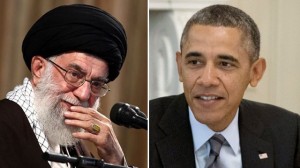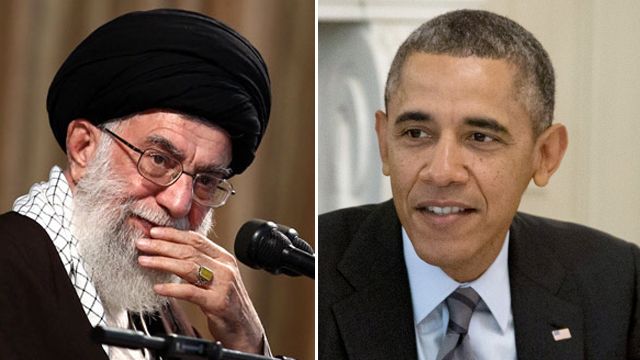by Peter Huessy
 The Nuclear Non-Proliferation Treaty (NPT) forbids any of its signatories, other than the five permanent members of the UN National Security Council, from having nuclear weapons. Of the 190 signatories to the treaty, Iran is one. So there already is an internationally agreed upon law that forbids Iran from getting nuclear weapons even if it meets all the rules in producing nuclear energy for electricity.
The Nuclear Non-Proliferation Treaty (NPT) forbids any of its signatories, other than the five permanent members of the UN National Security Council, from having nuclear weapons. Of the 190 signatories to the treaty, Iran is one. So there already is an internationally agreed upon law that forbids Iran from getting nuclear weapons even if it meets all the rules in producing nuclear energy for electricity.
So why do we need another agreement between the US and Iran to stop Tehran’s nuclear program?
Can’t we just enforce the current NPT?
Apparently not.
It is true that Iran has violated so many provisions of the NPT that the UN Security Council and the UN’s International Atomic Energy Administration (IAEA) has imposed a second protocol requirement on Tehran to insure it abides by the 1970 treaty as well as major economic sanctions, on top of those imposed by key members of the international community including and most importantly the United States.
But Iran has not abided by the second protocol nor the underlying NPT and continues to spin its centrifuges and produce nuclear fuel. And demand that all sanctions be ended.
But instead of simply getting Iran to live up to its obligations under the NPT, a treaty which Tehran signed and ratified in 1968 and 1970, respectively, the five permanent members of the NPT plus Germany (known as the P5+1), are trying to give Iran a special deal.
How special?
Well, the P5+1 have in short proposed to unilaterally amend the NPT–but just for Iran, no other country.
They would allow Iran–while still a member of the NPT– to permanently enrich uranium as part of a new deal in return for agreeing for some number of years, probably 8-10, not to enrich “too much”. There is, contrary to some conventional wisdom, no “right to enrich” under the NPT or any other law so this new agreement is in fact a “really big deal”.
There are nearly two dozen countries that produce nuclear energy that do not enrich uranium. Others that do are under IAEA safeguard agreements that do not allow–in theory and mostly in practice– the diversion of such fuel to bomb making grade. So this new deal is not needed to provide nuclear energy for Iran. The original NPT allows for that if you follow the rules, which Iran has not.
Iran in short is asking for special status in the nuclear bomb business regulated by the NPT.
Not only is Iran asking that they be allowed to maintain thousands of spinning centrifuges that can enrich uranium, they are demanding that they have nuclear reactors that can produce plutonium–which if properly enriched can make nuclear bombs.
Tehran is also demanding that there be no restrictions on its ballistic missiles, when its arsenal is already the largest in the Middle East. This despite that according to the Director of National Intelligence, Iran has rockets that can reach all of the Middle East and much of Europe, and is moving in the direction of having an ICBM capability as early as this year.
Iran is also demanding that there be no restrictions on its state sponsorship of terror nor its support, financing and arming of terror groups such as Hamas, Al Qaeda and Hezbollah.
Tehran also apparently will be given a pass on its complicity in the attacks against Americans in Iraq, Afghanistan, as well as the terror attacks at Khobar Towers, the African embassies and the World Trade Center in 2001, (as outlined by the 9-11 Commission Report).
Iran, despite demands by the UN Security Council that it do so, has not provided access to UN inspectors to those facilities in Iran IAEA believes were used for nuclear weapons work. In fact such facilities have been razed to the ground and bulldozed by Tehran, eliminating what evidence might be available for inspection. This is very serious in that in 2009 the attorney for Manhattan indicted a Chinese company–for the second time–for providing the top Iranian military commission in Tehran with nuclear weapons technology components. Components that might very well be buried under tons of Iranian dirt and sand.
In light of this sad history, it is understandable that any agreement with Iran should in the eyes of Congress have the solid concurrence of the House and Senate, and if not a legal agreement requiring a simple majority vote, then a treaty requiring concurrence of two-thirds of the US Senate.
But as our Secretary of State has testified to Congress, the contemplated agreement with Iran will not be a treaty and will not have the force of law. It will be akin to an executive agreement, although the US Department of State spokesperson said at some time down the road while the agreement in still in place, Congress might be asked to remove the Congressionally imposed sanctions against Iran.
Here we have an executive agreement that requires subsequent Congressional action to which the Congress has not agreed to in the first place.
This is indicative of the problem if the potential agreement is not law or treaty.
There are also five other big issues.
First the deal will amend the NPT unilaterally by an agreement of only 7 of the 190 other nation members of the NPT. Others will not give their concurrence. And it will do so contrary to the current provisions of international law that lay out a well defined path for any changes to the NPT.
Second, given the NPT is a treaty to which the Senate consented in 1970, the NPT can only be amended by Senate concurrence in any such changes.
Third, if the agreement is not law in so far as the US obligations go, what about those of the government in Tehran? Will they make this agreement a law or will the Supreme Leader be allowed to change its terms unilaterally?
Fourth, if the agreement is not law this means in so far as the US constitutional system goes, any future President need not abide by its terms, and certainly any future Congress is not bound by its terms.
Fifth, if the administration is seeking UN Security Council approval of the agreement, but not Senate approval, they are standing the constitutional law of American foreign policy on its head. Since when can the UN Security Council amend US Treaty law? The UN can certainly propose amendments but they cannot approve such changes on behalf of the US Congress and the American people.
47 US Senators put many of these same points in a March 2015 letter which they sent to the rulers in Tehran. This was met with thunderous condemnation by the administration, including the charge that obviously the Senate signers did not trust the administration to abide by the terms of the executive agreement.
Unfortunately the administration complaint has things exactly backward.
The Senate signers are worried that any agreement with Iran not required to secure Senate or House concurrence will be by its very nature weak and filled with too many concessions to Tehran, many which we mentioned above. Implicit in the letter is the concern that any agreement just between the rulers in Tehran and the US administration will not have sufficient safeguards–tough safeguards that the mullahs in Iran would probably not accept and thus will not be in the agreement–making its approval by the Senate unlikely.
In short, the Senate signers certainly trust that the administration will in fact abide by the terms of a new agreement.
But that’s the problem–the agreement it is feared will not be adequate. Requiring Senate concurrence would obligate the provisions of a new agreement to stand the sunlight of tough examination during Senate debate. In short, the Senate critics of the pending deal with Iran simply do not share the belief by this administration that Iran can become some “partner for peace” with the US.
Thus the Senators are opposed to an agreement that comes with a letter to the Senate declaring “Trust us” and is seen as an adequate substitute for the Senate scrutiny a treaty agreement would require.
For example, one very important safeguard not in the agreement says the Secretary of State is that the agreement will expire. That’s right, it will end.
And on that date Iran can return to a “normal” or ordinary state member of the NPT, despite its centrifuges, despite its terrorism and missiles. It will then be free to enrich uranium to its heart’s content, a “right” not in the NPT.
Then Tehran, unfettered by second protocols, or sanctions, or enhanced inspections, can decide to either (1) publicly throw away the confines of the original NPT and breakout toward nuclear weapons development; or (2) surreptitiously sprint to the development of a modest arsenal of nuclear weapons under the cover the NPT.
Now Administration supporters say don’t worry. Down the road a decade or so the government of Iran will have changed.
Really? We have seen this deal before.
North Korea joined the NPT in 1985.
It signed a deal with the US, promising not to produce nuclear weapons in an October 1994 “Agreed Framework” after the IAEA in 1992 found suspicious discrepancies in its nuclear fuel production.
In 1998, North Korea (the DPRK) launched a long-range rocket that had the capability if further developed of carrying a 2000 pound warhead at least to Hawaii and Alaska.
In 2002, the DPRK admitted cheating on the Agreed Framework and producing enriched uranium at a secret centrifuge facility.
In 2003, the DPRK withdrew from the NPT.
In 2006, the DPRK exploded a nuclear weapon.
IN 2007 the DPRK actually signed a new “agreement” with the United States to denuclearize the Korean peninsula and end its nuclear bomb program.
But the DPRK never implemented the agreement.
The DPRK subsequently complained the US requirement for a “permanent” end to a North Korean nuclear bomb program was unfair.
So did many in the American arms control community as they criticized the Bush administration for pushing an agreement that was “too tough”.
In 2009 and 2013, the DPRK exploded more nuclear bombs.
Today, intelligence estimates are that Pyongyang has 10 nuclear warheads.
And ballistic missiles that can strike the West Coast of the United States with a small payload.
But North Korea also launched into orbit in 2014 a small mock satellite that passed over New York and Washington, D.C.
The Director of National Intelligence says that this space launch capability gives North Korea a pathway to develop an ICBM or intercontinental ballistic missile capability.
Iran is the country with which North Korea most cooperates on ballistic missile development.
During the nuclear bomb tests by North Korea, satellite photographs show members of the Iranian military including the head of the Revolutionary Guard Corps visiting the North Korean nuclear test site.
So Washington, the letter is still the problem?
